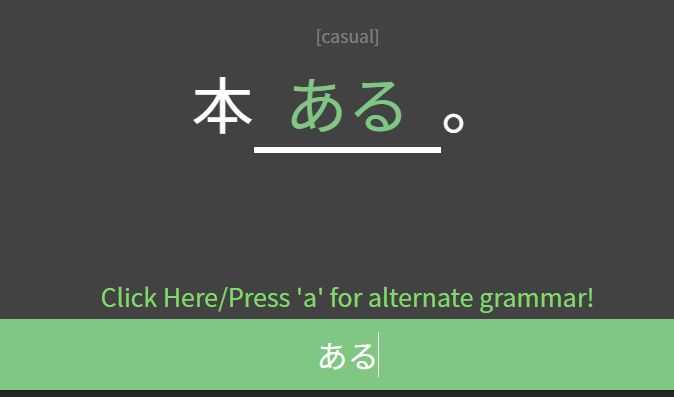to be・there is
Structure
- Noun + が・ある
[non-living things・inanimate objects]
Formal/Polite: があります

to be・there is
Structure
- Noun + が・ある
[non-living things・inanimate objects]
Formal/Polite: があります
None of the audio seems to work on the “がある” Examples tab? Is it just me?
It is working for me.
Have you tried turning off add blocking software on Bunpro?
It’s working today. Weird.
Just doesn’t work off and on. using Chrome
Hey guys, this grammar point confused me. Why is the が included in it? Isn‘t が a grammar point by itself? The ressources I used till now for grammar always teach ある / あります by itself without the が. Can somebody explain this to me? ^^‘ would be helpful, cause it confuses me quite a bit.
Hey and welcome on community forums 
Hey guys, this grammar point confused me. Why is the が included in it? Isn‘t が a grammar point by itself?
We teach about が、the subject marker three lessons earlier. 
The resources I used till now for grammar always teach ある / あります by itself without the が. Can somebody explain this to me? ^^‘ would be helpful, cause it confuses me quite a bit.
We think that is is good to teach about verbs in conjunction with particles they are used with. This way students won’t confuse particles, for example, won’t use 会う with を instead of に to mark person. Plus it’s good to know how properly say what exists when speaking about the existence
In case of ある the existence is marked by が, not は (though it can be used for example when contrasting, when asking about the location:
さとうはどこにある?Where is the sugar?
さとうはたなのうえにある。Sugar is on the shelf.
ペンはあるけど、消しゴムはない。I have the pen, but I don’t have the eraser) nor を.
Plus it’s easier this way to discriminate it from other uses of ある like とある + Noun - “a certain Noun”, verb[た] + ことがある - “verb has happened in past”, Aによると(A上) phrase + とある - “according to A” etc.
I hope it helps 
Thanks a lot for the response  It helped me to understand the usage and relation of が and あります.
It helped me to understand the usage and relation of が and あります.
What’s the difference between X がある and X があります? It seems it’s used interchangeably to say the same thing front the examples, but the grammar is different.
がある is casual and があります is polite. You should use the former when speaking to friends and the latter when speaking to superiors.
I see. Thank you!
How can I distinguish がある from だ? They seem to mean the same thing.
がある means ‘there is’ and だ means ‘it is’ or ‘they are.’
これはペンだ。 This is a pen
机の上にペンがある。There is a pen on the desk.
I have a a problem… i think. I hide the english hints completely when doing reviews, just for an extra challenge, but some examples show [casual] as a placeholder, so there is no way to know when to write がある or だ. Some proof:
This shows for some examples of different questions:
And だ is a correct answer:
As well as がある (or) ある :

Then english hints shows is or there is, making it possible to differenciate, but with hints off this is not possible. What to do? Or the only solution is to turn them on?
The site doesn’t work too well without English translations. For your extra challenge I suggest that you switch to yellow text only, so you know the grammar point you’re aiming for, but don’t get the full sentence in English.
I see, well thats to bad, I was not expecting to run into a problem like that, as that is an option they have. I guess that using the smallest hint is the solution then. Thank you!